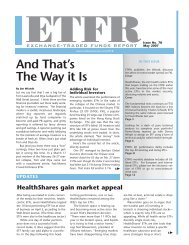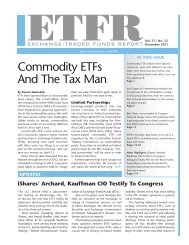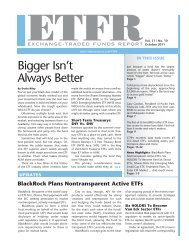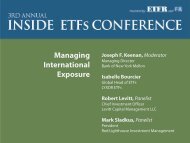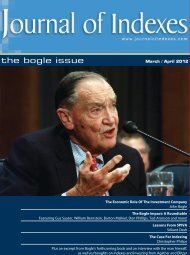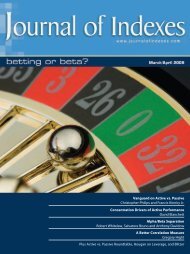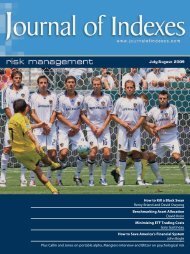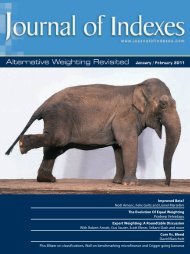Download - IndexUniverse.com
Download - IndexUniverse.com
Download - IndexUniverse.com
Create successful ePaper yourself
Turn your PDF publications into a flip-book with our unique Google optimized e-Paper software.
her attorney) is only likely to sue if the investment returns poorly<br />
and if that participant loses money, yet the plan fiduciary receives<br />
little benefit if things go right. While a plan fiduciary may think<br />
that ERISA §404(c) provides a defense for imprudent investing<br />
at the participant level, §404(c) does not provide protection<br />
with respect to the overall prudence of an investment. For those<br />
readers not familiar with §404(c), it offers a plan sponsor and its<br />
fiduciaries a defense for losses or lack of gains realized by participants<br />
who exercise independent discretionary investment control<br />
over their individual account balances (for additional information<br />
on §404(c), see “ERISA §404(c) Best Practices: Myths versus Facts”<br />
by David J. Witz). A plan can be §404(c)-<strong>com</strong>pliant, yet still have<br />
investments that are deemed imprudent under §404(a).<br />
Conclusion<br />
Given current technology, the cost savings from ETFs in 401(k)<br />
plans appear to be minimal. While the expense ratios for ETFs<br />
may be less than their respective indexed mutual fund peers, this<br />
lower cost is materially eroded by the explicit and implicit costs<br />
associated with making the ETFs “401(k)-ready.” In fact, it is likely<br />
that an ETF 401(k) strategy would end up being more expensive<br />
than a mutual fund strategy after all the costs are considered.<br />
Minimizing plan expenses is an important consideration for a<br />
plan sponsor and plan fiduciaries, but it doesn’t take ETFs for this<br />
to happen. Plan sponsors can select index mutual funds as lowcost<br />
investment solutions for participants in an attempt to minimize<br />
overall plan fees. It’s important to remember that the purpose<br />
of a retirement plan is to help employees and participants<br />
retire, not to necessarily have funds that outperform their peers.<br />
While a discussion of the benefits of active versus passive management<br />
is beyond the scope of this paper, it is always important<br />
to note that index investing is a much easier strategy to defend<br />
(in court) and to monitor than a strategy that involves trying to<br />
find next year’s top active manager (and rarely succeeding).<br />
[A version of this article first appeared in the Journal of Pension<br />
Benefits, Winter, 2007.]<br />
Bibliography<br />
Collective Investment Funds: Comptroller’s Handbook: www.occ.treas.gov/handbook/CIFfinal.pdf.<br />
Deville, Laurent, 2006, “Exchange Traded Funds: History, Trading and Research,” http://halshs.archives-ouvertes.fr/docs/00/16/22/23/PDF/ETF-survey.pdf.<br />
ERISA Section 404(c) Checklist: http://www.reish.<strong>com</strong>/pa/benefits/404c.cfm.<br />
Israelsen, C. L., 2006, “Things Are Not Always What They Seem,” Journal of Indexes, vol. 8, no. 2 (March/April): 18–24.<br />
Kasten, Gregory K., 2005, “Self-Directed Brokerage Accounts Tend to Reduce Retirement Success and May Not Decrease Plan Sponsor Liability,” Journal of Pension Benefits, vol.<br />
12, no. 2 (Winter): 43–49.<br />
John Hancock Lifestyle Portfolios Produce Better Results for 401(k) Plan Participants 2006: http://www.johnhancock.<strong>com</strong>/about/news/news_aug1406.jsp<br />
Munnell, Alicia H., Mauricio Soto, Jerilyn Libby, and John Prinzivalli, 2006, “Investment Returns: Defined Benefit vs. 401(K) Plans,” Center for Retirement Research, no. 52: http:/<br />
www.bc.edu/centers/crr/issues/ib_52.pdf.<br />
Reish, Fred, Bruce Ashton and Gail Reich, 2001, “Is It Prudent to Offer Brokerage Accounts to 401(k) Participants?” http://www.reish.<strong>com</strong>/publications/article_detail.cfm?ARTICLEID=281.<br />
Sammer, Joanne, 2006. “How to Manage the Pitfalls of Company Stock in 401(k) Plans,” Journal of Accountancy Online: http://www.aicpa.org/pubs/jofa/apr2006/sammer.htm.<br />
Appendix I – ETFs For The MSCI, S&P And Russell Indexes<br />
Morningstar Net Expense Inception<br />
Ticker Type* Investment Name Category Assets ($B) Ratio Date Benchmark Index<br />
VUG ETF Vanguard Growth ETF Large Growth $2.57 0.11% 01/26/04 MSCI US Prime Market Growth Index<br />
IVW MF iShares S&P 500 Growth Index Large Growth $5.24 0.18% 05/22/00 S&P 500/Citigroup Growth<br />
IWF MF iShares Russell 1000 Growth Index Large Growth $11.53 0.20% 05/22/00 Russell 1000 Growth Index<br />
VV ETF Vanguard Large Cap ETF Large Blend $0.95 0.07% 01/27/04 MSCI US Prime Market 750 Index<br />
IVV MF iShares S&P 500 Index Large Blend $17.32 0.09% 05/15/00 S&P 500 Index<br />
IWB MF iShares Russell 1000 Index Large Blend $3.62 0.15% 05/15/00 Russell 1000 Index<br />
VTV ETF Vanguard Value ETF Large Value $2.24 0.11% 01/26/04 MSCI US Prime Market Value Index<br />
IVE MF iShares S&P 500 Value Index Large Value $4.39 0.18% 05/22/00 S&P 500/Citigroup Value<br />
IWD MF iShares Russell 1000 Value Index Large Value $9.88 0.20% 05/22/00 Russell 1000 Value Index<br />
VOT ETF Vanguard Mid-Cap Growth ETF Mid-Cap Growth $0.15 0.13% 08/17/06 MSCI US Mid Cap Growth Index<br />
IWP MF iShares Russell Midcap Growth Index Mid-Cap Growth $2.77 0.25% 07/17/01 Russell Midcap Growth Index<br />
IJK MF iShares S&P MidCap 400 Growth Index Mid-Cap Growth $2.05 0.25% 07/24/00 S&P MidCap 400/Citigroup Growth Index<br />
VO ETF Vanguard Mid Cap ETF Mid-Cap Blend $1.19 0.13% 01/26/04 MSCI US Mid Cap 450 Index<br />
IJH MF iShares S&P MidCap 400 Index Mid-Cap Blend $4.90 0.20% 05/22/00 S&P MidCap 400 Index<br />
IWR MF iShares Russell Midcap Index Mid-Cap Blend $3.79 0.20% 07/17/01 Russell Midcap Index<br />
VOE ETF Vanguard Mid-Cap Value ETF Mid-Cap Value $0.20 0.13% 08/17/06 MSCI US Mid Cap Value Index<br />
IWS MF iShares Russell Midcap Value Index Mid-Cap Value $3.65 0.25% 07/17/01 Russell Midcap Value<br />
IJJ MF iShares S&P MidCap 400 Value Index Mid-Cap Value $2.67 0.25% 07/24/00 S&P MidCap 400/BARRA Value Index<br />
VBK ETF Vanguard Small Cap Growth ETF Small Growth $0.78 0.12% 01/26/04 MSCI US Small Cap Growth Index<br />
IWO MF iShares Russell 2000 Growth Index Small Growth $2.96 0.25% 07/24/00 Russell 2000 Growth Index<br />
IJT MF iShares S&P SmallCap 600 Growth Small Growth $1.49 0.25% 07/24/00 S&P SmallCap 600/Citigroup Growth Index<br />
VB ETF Vanguard Small Cap ETF Small Blend $0.98 0.10% 01/26/04 MSCI US Small Cap 1750 Index<br />
IWM MF iShares Russell 2000 Index Small Blend $11.31 0.20% 05/22/00 Russell 2000 Index<br />
IJR MF iShares S&P SmallCap 600 Index Small Blend $4.94 0.20% 05/22/00 S&P SmallCap 600 Index<br />
VBR ETF Vanguard Small Cap Value ETF Small Value $0.77 0.12% 01/26/04 MSCI US Small Cap Value Index<br />
IWN MF iShares Russell 2000 Value Index Small Value $4.17 0.25% 07/24/00 Russell 2000 Value Index<br />
IJS MF iShares S&P SmallCap 600 Value Index Small Value $1.81 0.25% 07/24/00 S&P SmallCap 600/Citigroup Value Index<br />
Source: Vanguard. Data as 11/02/07. *MF = Mutual Fund, ETF = Exchange-Traded Fund. **30-Day Average.<br />
40<br />
July/August 2008




